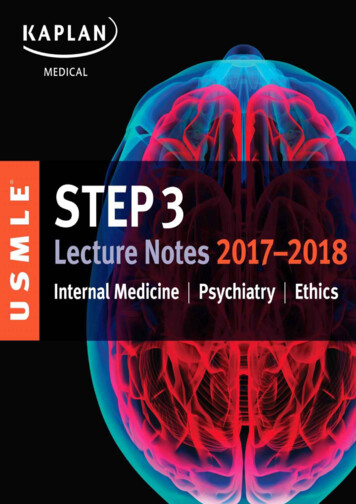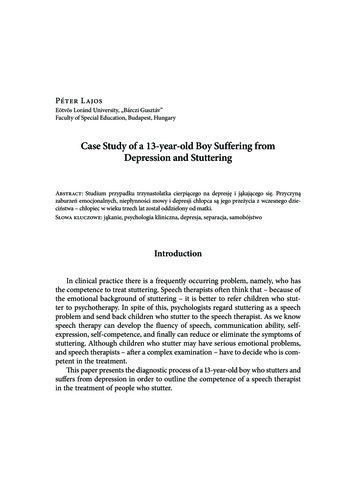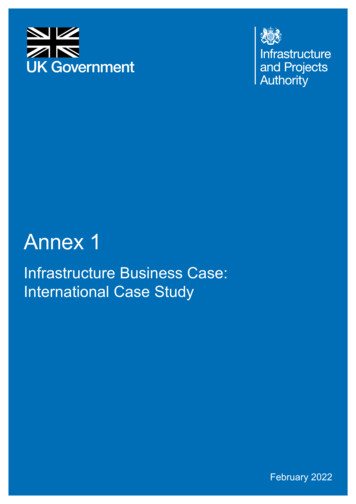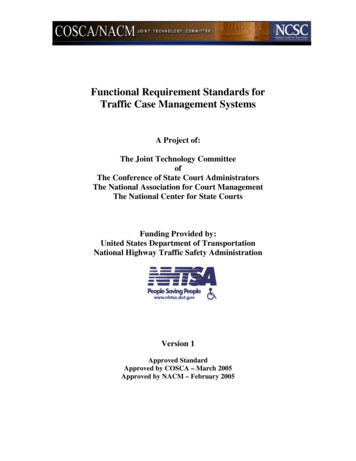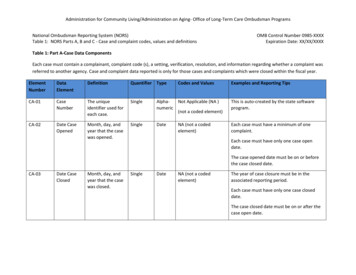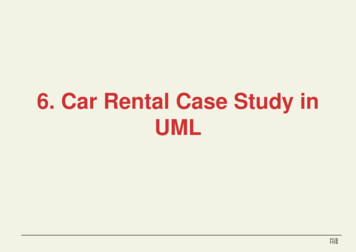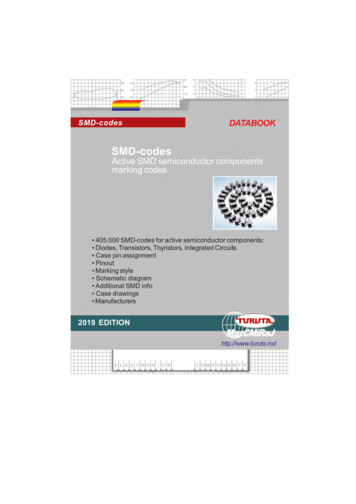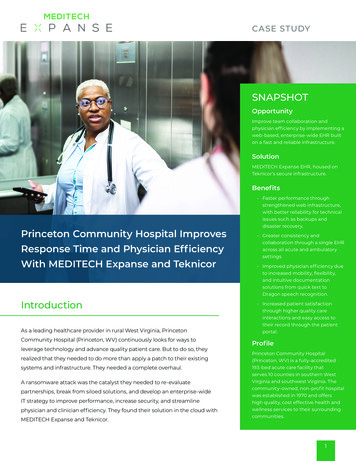
Transcription
CASE STUDYSNAPSHOTOpportunityImprove team collaboration andphysician efficiency by implementing aweb-based, enterprise-wide EHR builton a fast and reliable infrastructure.SolutionMEDITECH Expanse EHR, housed onTeknicor’s secure infrastructure.BenefitsPrinceton Community Hospital ImprovesResponse Time and Physician EfficiencyWith MEDITECH Expanse and TeknicorIntroductionAs a leading healthcare provider in rural West Virginia, PrincetonCommunity Hospital (Princeton, WV) continuously looks for ways toleverage technology and advance quality patient care. But to do so, theyrealized that they needed to do more than apply a patch to their existingsystems and infrastructure. They needed a complete overhaul.A ransomware attack was the catalyst they needed to re-evaluatepartnerships, break from siloed solutions, and develop an enterprise-wideIT strategy to improve performance, increase security, and streamlinephysician and clinician efficiency. They found their solution in the cloud withMEDITECH Expanse and Teknicor. Faster performance throughstrengthened web infrastructure,with better reliability for technicalissues such as backups anddisaster recovery. Greater consistency andcollaboration through a single EHRacross all acute and ambulatorysettings Improved physician efficiency dueto increased mobility, flexibility,and intuitive documentationsolutions from quick text toDragon speech recognition. Increased patient satisfactionthrough higher quality careinteractions and easy access totheir record through the patientportal.ProfilePrinceton Community Hospital(Princeton, WV) is a fully-accredited193-bed acute care facility thatserves 10 counties in southern WestVirginia and southwest Virginia. Thecommunity-owned, non-profit hospitalwas established in 1970 and offershigh quality, cost effective health andwellness services to their surroundingcommunities.1
ChallengesPrinceton’s previous EHR approach was disjointedWith ambitions of extending their reach by acquiringwith too many disparate systems, slow responsenew sites, Princeton knew they could not continuetimes, and poor usability. Their hardware was quicklyforward in their current state. They needed a morebecoming outdated with slow response times, and theirdependable solution to ensure their EHR remainedsystem was taken down by ransomware, opening thesecure and available 24/7, and that their cliniciansorganization up to security breaches.could access patient records quickly, efficiently, andcollaboratively across the continuum.Collaborating with TeknicorThe first step in Princeton’s efforts came in anunexpected way. When their current systemwas brought down by ransomware, they soughtoutside expertise on how to recover. Based on arecommendation from their MEDITECH representative,they brought in Teknicor — a leading provider of datacenter infrastructure, protection, and cloud solutions— to help. The support they received from Teknicorthroughout the process was so impressive, they decidedto contract with them for the ongoing maintenance oftheir MEDITECH Client/Server infrastructure. When theylater selected MEDITECH Expanse as their go-forwardEHR, their choice for infrastructure update and redesignwas clear. Teknicor provided them with the scalable,high performance solution they needed to support theirnew advanced EHR, along with the flexibility to expandto new facilities in the future.MEDITECH Expanse brought with it new levels oftechnological advancements, housing the patient’sEHR in Princeton’s own private cloud and making itaccessible from mobile devices through a standardweb browser. Teknicor’s infrastructure design — whichAdditionally, Princeton’s recent ransomware attacktaught them the necessity of having a solid approachto mitigate potential disasters. Wayne Richmondspearheaded these efforts as project manager, laterascending to the role of Director of IT in 2019. Underhis guidance, his team at Princeton was able to bringall players together to lessen the impact of any futureattack.“By integrating these siloed systems into our disasterrecovery (DR) plan, we now have a complete cloudrecovery to operate from if needed,” states Richmond.included an updated SAN, servers, backup and recoveryTeknicor worked with them to design an off-premisesoftware — provided them with the speed and responsedisaster recovery center managed by Teknicor that couldtimes necessary for mobile devices. Teknicor alsoget Princeton up and running immediately if anothersimultaneously maintained Princeton’s Client/Serversecurity incident occurred. Updates are continuouslysystem during the Expanse implementation and for asent to Teknicor’s data center, which provides peace ofshort period thereafter to ensure a smooth transition.mind for the organization and its providers.2
Moving Forward with One EHR ApproachTo truly improve efficiency, addressing hardwareinfrastructure was only half of the equation. Princeton’sdecision to move to Expanse came after researchingother EHR vendors, and realizing that the mobility,user-centered workflow, and integration of Expanse waswhat they needed to advance patient care across allof their facilities. While they were already familiar withMEDITECH in the hospital setting, Expanse empoweredthem to replace multiple disparate practice solutionsand develop one patient record across all care settings.Collectively, Princeton’s practices previously used fivedifferent systems, including paper. This included theirrecent acquisition of three rural clinics and two generalsurgery practices from the purchase of a new site. Today,they have one EHR across all acute, ED, and ambulatorysettings, along with one central billing office — so careteams can easily access the full patient story. The patientrecord includes fewer tabs, with workflows more tightlyintegrated around each user’s role. Scanned documentsDriving Adoption Through a PhysicianAdvisory CommitteeTo ensure a successful and widespread EHR roll-out,Princeton developed a Physician Advisory Committee(PAC) with five leaders from different specialties.Physicians were compensated for their time, whichincreased participation. Administrators ensured itwas mandatory that all physicians receive trainingby implementing a policy that no training meant noprivileges to write orders.Princeton started by bringing in standard contentprovided by MEDITECH and then defining favoriteorder sets at a corporate level. Once standard ordersets were agreed upon, they would open them up formodification per staff request. Working with IT ClinicalAnalysts, the physicians immediately took to these ordersets, as it made it quicker for them to enter orders andbecause they could be personalized to their needs.are also instantly accessible. For specialists who also seeBy engaging physicians early in the implementation,patients in the hospital, onboarding one system wasPrinceton fostered a sense of ownership, which helpedeasier, with patient records fully integrated and workflowwith adoption. There was always an advocate in theremaining consistent across settings.room during PAC meetings to share ideas on how tocomplete tasks with fewer clicks, which would lead togreater efficiency.3
A Mobile Approach to DocumentationWhile all physicians can access Expanse over mobileIn addition to Dragon, Expanse offers otherdevices, Princeton gives their physicians the flexibility todocumentation features that improve provideruse whatever documentation approach works best forefficiency, such as quick text, favorites, documentationthem. For example, many clinicians use Microsoft Surfaceof normals, and the ability to recall values from priorBooks in exam rooms to complete their documentation,documentation. “One physician in his late 60s, whowhile others use them to walk their patients throughstruggles with typing, loves it since it includes the voicetheir records, but elect to complete their documentationrecognition and all of the shortcuts, such as cannedoutside the room so they can focus more on the patient.text, quick text, and favorite orders,” said Dr. Lohuis. “YouOthers use scribes. Hospitalists also document at thecan customize the system so well, just like you do yourpoint of care using an iPad or by bringing their ownsmartphone. You can make it yours.” device. This approach to mobility helps staff build a closerrelationship with patients. Providers even bring theirdevices home to access records for on call purposes,without having to first connect to an on-site network.Princeton collaborated with MEDITECH to ensureExpanse fit their organizational needs, and thenpersonalized it to the individual level. For example, theycreated a customized coagulation visit that drops theOne of the most popular tools for improving efficiencyappropriate codes for billing and a Medicare Wellnessand increasing patient engagement has been Nuance’sVisit workflow that is tailored for primary care, with setDragon Medical One solution, which provides aambulatory and EMR preferences.speech-enabled workflow designed to acceleratethe completion of clinical documentation in Expanse.Physicians can use Dragon in the room with patients forassessments and medication planning. This promotesan interactive experience with patients, as physiciansdictate in Dragon and patients walk out with clear nextsteps. “Dragon has become a popular and importanttool for care teams,” said Dr. Nancy Lohuis, PhysicianBilling diagnosis is also attached to order sets forpreventative care, which works well for providers.Coding and billing has improved by capturing datathrough documentation, including canned text usedfor coding risk or depression score, BMI, nutritional care,osteoporosis score, advanced care planning, living wills,tobacco cessation, and more.Champion. “Patients have gotten so used to medictating a visit summary that sometimes they ask for itif it’s not being used!”“You can customize the system sowell, just like you do your smartphone.You can make it yours.”Nancy Lohuis, MD, Physician ChampionPrinceton Community Hospital4
Physician Efficiency and FlexibilityReaping the BenefitsPrinceton attributes the high adoption rate for ExpanseBy centralizing their strategy with MEDITECHto the system’s flexibility to tailor to each physician andExpanse and switching to Teknicor for their hardwaretheir specific needs. General surgeons now see moreinfrastructure, Princeton realized faster systempatients per day. They can follow the entire operativeperformance, greater accessibility to shared records, andprocess from completing prep assessments to recoveryincreased mobility. Benefits included:and discharge, using tools like quick text and Dragon.Acute nurses also have access to post medical andsurgical history on the floors. In the practice setting,physicians and nurses enjoy a shared patient record anddocumentation, with ambulatory nurses adding directly Greater reliability and response times for technicalissues such as backups and disaster recovery. The scalability to extend services to other physicianoffices and service lines. Improved physician efficiency and satisfaction throughto the active problem list and historical section. Thistheir mobile approach and ability to personalize theshared documentation improves collaboration betweensolution to physician needs.care teams, resulting in clearer, more consistentcommunication. More meaningful patient engagement by using sharedrecords across their care settings and reviewing theserecords with their patients in the exam room.A Look AheadWith a shared patient record in place, Princetonhas received the funding to be a Telemedicine CenterCommunity now sees the opportunity to extend theirfor Excellence and is looking to expand their telehealthpopulation health efforts through patient registries. Theyofferings to nutritional needs, speech management, andwere already developing registries for wellness, diabetes,screening. They are also looking to connect more withand chronic care management before COVID-19 becametheir patients by using messaging within their patienttheir top priority. Chronic care management will alsoportal.remain a primary focus, with Dr. Lohuis piloting ten ofher own patients on a chronic care registry.With MEDITECH Expanse and Teknicor workingtogether as a strong foundation, Princeton CommunityPhysicians are also looking at ways to connect morenow looks to leverage their solutions for continuedwith their patients outside facility walls. The organizationgrowth and innovation.5
INNOVATORS AT 1 (781) 821-3000www.meditech.cominfo@meditech.comConnect with us:
new advanced EHR, along with the flexibility to expand to new facilities in the future. MEDITECH Expanse brought with it new levels of technological advancements, housing the patient's EHR in Princeton's own private cloud and making it accessible from mobile devices through a standard web browser. Teknicor's infrastructure design — which
